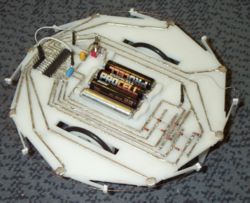Make-it-all Machine for Do-it-yourself Homeowners
Adrian Bowyer envisions a common manufacturing device that could make Wal-Mart practically obsolete. Instead of running out to buy a set of goblets or plates, you'd simply design them on your make-it-all machine and push a button. Poof, whatever you want comes out.
His idea is based on "rapid prototype machines," which industry already uses to make plastic auto parts. A concept is detailed in 3D on a computer, and then the machine manufactures the item automatically. The machines aren't cheap, of course (and it means yet another device on your kitchen counter).
But if Bowyer can pull it off, the machine would inarguably be a handy addition to any stable of household appliances. While it sounds like a huge "if" for now, Bowyer sees it all coming true in just a few years.
In fact, he thinks the magical machines will even manufacture themselves. And that's the key to making it all happen.
Bowyer figures little robotic factories could be instructed to make copies of themselves, and the clones would make more, and so on until the price of each became reasonable. He's working right now on designing a machine that could reproduce itself.
"People have been talking for years about the cost of these machines dropping to be about the same as a computer printer," Bowyer, a "biomimetics" researcher at the University of Bath in the UK. "But it hasn't happened. Maybe my idea will allow this to occur."
In a twist in the secretive world of industrial design, Bowyer says he'll put his plans on the Internet, so anyone can build one of these self-cloning devices. He's taken out no patents. Those who succeed could presumably sell their copies to others who would make more, Bowyer says.
Sign up for the Live Science daily newsletter now
Get the world’s most fascinating discoveries delivered straight to your inbox.
He expects the plans to be posted in stages over the next four years.
"If these machines take off, it will give individual people the chance to do this themselves, and we are talking about making a lot of our consumer goods," Bowyer said. "The effect this has on industry and society could be dramatic."
A countertop manufacturing device might make dishes and bowls out of plastic with personalized designs. Fine. But everyone knows what we really could use is the ability to replace temperamental toasters. Won't happen. Special alloys that melt at low temperatures might be employed to allow construction of electronics, Bowyer says, but toasters are out because of the intense heat they must withstand.
Bowyer likens the development process to natural evolution. As the machines replicate, users would tweak them to suit individual needs.
The idea is not new. Bowyer's device, if he succeeds, would be a techno-child of the never-built Universal Constructor, proposed theoretically in the 1950s by mathematician John von Neumann.
The RepRap Project

Credit: U. of Bath
Robert is an independent health and science journalist and writer based in Phoenix, Arizona. He is a former editor-in-chief of Live Science with over 20 years of experience as a reporter and editor. He has worked on websites such as Space.com and Tom's Guide, and is a contributor on Medium, covering how we age and how to optimize the mind and body through time. He has a journalism degree from Humboldt State University in California.










